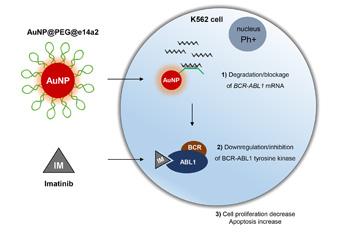Associação Portuguesa de Investigação em Cancro
Investigadores portugueses combinam silenciamento génico por nanopartículas de ouro e quimioterapia standard no combate à leucemia
Investigadores portugueses combinam silenciamento génico por nanopartículas de ouro e quimioterapia standard no combate à leucemia

Recorrendo ao silenciamento génico específico em células de leucemia mediado por nanopartículas de ouro, um grupo de investigadores portugueses conseguiu aumentar a eficácia terapêutica da quimioterapia standard. De facto, em células de leucemia mieloide crónica, a entrega de um silenciador do oncogene BCR-ABL1 viu a sua potencia maximizada pela vectorização em nanopartículas de ouro coloidal, uma estratégia que tem vindo a ser optimizada por este grupo na Faculdade de Ciências e Tecnologia da Universidade Nova de Lisboa. Este grupo da Unidade de Investigação em Ciências Biomoleculares Aplicadas (UCIBIO) demonstrou que combinando nanomedicina com a quimioterapia standard foi possível aumentar a morte das células tumorais de forma selectiva e, ainda, reverter situações de resistência a quimioterapia. Este estudo demonstra o potencial da nanomedicina para o tratamento de tumores líquidos.
Autores e Afiliações:
Raquel Vinhas1, Alexandra R. Fernandes1, Pedro V. Baptista1
1 UCIBIO, Departamento de Ciências da Vida, Faculdade de Ciências e Tecnologia, Universidade Nova de Lisboa
Abstract:
Introduction of tyrosine kinase inhibitors for chronic myeloid leukemia treatment is associated to a 63% probability of maintaining a complete cytogenetic response, meaning that over 30% patients require an alternative methodology to overcome resistance, tolerance or side-effects. Considering the potential of nanotechnology in cancer treatment and the benefits of a combined therapy with imatinib, a nanoconjugate was designed to achieve BCR-ABL1 gene silencing. Gold-nanoparticles were functionalized with a single-stranded DNA oligonucleotide that selectively targets the e14a2 BCR-ABL1 transcript expressed by K562 cells. This gold-nanoconjugate showed great efficacy in gene silencing that induced a significant increase in cell death. Variation of Bcl-2 and Bax protein expression, increase on caspase-3 activity and apoptotic bodies in cells treated with the nanoconjugate demonstrate its aptitude to induce apoptosis on K562 BCR-ABL1-expressing cells. Moreover, combination of the silencing gold-nanoconjugate with imatinib prompted a decrease of imatinib IC50. This Au-nanoconjugate was also capable of inducing the loss of viability of imatinib-resistant K562 cells. This strategy shows that combination of gold-nanoconjugate and imatinib make K562 cells more vulnerable to chemotherapy and that the Au-nanoconjugate alone may overcome imatinib resistance mechanisms, thus providing an effective treatment for chronic myeloid leukemia patients that exhibit drug tolerance.
Revista: Molecular Therapy - Nucleic Acids
Link: http://www.sciencedirect.com/science/article/pii/S2162253117301737?via%3Dihub




